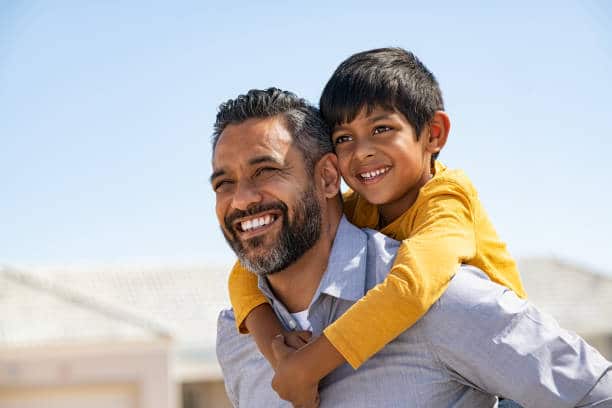The voice of men without children that age needs to be heard. I noticed that the documentation on Internet is mostly on women, but what about men that would have wanted to be a father?
In this article, I will talk about the journey of three men without children and that are 55 years old and over.
I will shed light on what they lived, rheir fears, their doubts and their joys.
I invite you to explore this subject. Because that's what it is about. Unique and nonconformist experiences.
I welcome you to explore!
Why not become a father ?
There are many reasons that explain why the participants did not become fathers.
The first participant says that it's because of his sexual orientation and the denial of this in the context of his time.
At the time (in the 80s), when you were gay, having children was not in the plans unless you were courageous and determined.

If he were seventeen today, becoming a father would be part of his future. He admits he's a little jealous when he sees young gay couples today that adopt children or who call upon mother carriers.
A second participant says that he did not become father by choice and because of life circumstances. Actually, he was in relashionships with women who did not want children or could not have children.
For me, love was more important than having children, love of a companion. If you do not want children, it's not a requirement. If you live 10 years with someone who does not want children, it's a need that you have put aside.
The diagnosis of bipolar disorder of this participant also made him hesitate to have children.
The third participant married at a young age and the medical problems of his wife prevented the couple from having children.
God did not enable us to have childre, why adopt ?
This participant was afraid of adopting because friends of his parents had bad experiences. Their adopted girls, when they became of age, asked to have back their possessions and assets and they left.
Social pressure to have a family
A participant felt pressured to have a family, and even more being an heterosexual.
I was raised as a macho man. My father wanted me to be a hockey player. I was raised that way. Being young, I was not particularly nice with effeminate men. They pushed me away too much, they bothered me.
A second participant expressed that he did not have pressure of his family : « If you are in love, that is what is important. » As a baby-boomer, he considered that there were other men without children. The pressure would come more from work and the catholic church when he was involve in social pastoral.
'' But the pressure would not do anything. I am a non-conformist. I had an answer prepared. My wife and I are a little old for this. ''
Saying goodbye to having a child
Two participants had to say good-bye to having children.
A participant said that the fact of having done a therapy to accept his sexual orientation helped himto accept the fact of not having children.
A second participant maintains that the fact of having immigrated to Canada helped him to say good-bye to having children : « It's just as we started another life. »

For the third participant, it was not so much saying good-bye to having children because it became more and more a choice.
Advantages of not having children
According to two participants, not having children reduces the daily constraints.
This also reduces the complex relationship that can be established between a child and his parent.
To not have children implies that we can think more about ourselve, to be free, to be more involved in our career. To be able to spoil ourselves more on a monetary level and to have less concerns. It's also having more time for other activities such as: taking care of aging parents, working for our spouse or husband's company, organizing events for gay men or doing domestic tasks.
A third participant also asserts being more available in his professional life, and actually, he takes time to cook meals for his wife who works: « I am like a man at home. »
The disadvantages of not having children
On the contrary, according to one participant, not having children takes the meaning out of life.
" Having children puts a lot pf meaning in one's life. When you don't have children, you have to concentrate on something else. You have to be useful with something else somewhere else.
Concentrating on someone else brings meaning to life.
" I remember celebrating Christmas and I was saying to myself you don't take care of anyone. You just take care of yourself. Perhaps my Christmas would have been more interesting if there were children. "
Not having children also creates a problem of continuity, knowing that there is nobody else after us and we don't know to whom we can transmit our life experience.
" It's hard for the heritage, what you are going to transmit, but there are ways you can do it. My heritage is sharing and solidarity.
In addition, when there is a balanced family life, it tends to balance the other spheres of occupations.
Old age without a child
Old age without a child can be facilitated by friends helping each other.
" A good part of our circle is gay. We tell each other that we are going to buy a big house and help each other out. We look at the youngest of the group and we tell him as a joke that it's him who will change our diapers. "
For the same participant, getting old without a child gives him a feeling of injustice. In the sense that there will be nobody to take care of him, except for the public health services and the CHSLD. This is not reassuring in the context of personnel shortage. He is afraid to find himself with unexperienced personnel.
" I say my mother when she was dying in a rehabilitation center. It was during the pandemic. She had a bag of stools, she was completely lost, she would pull out the bag. The staff would come into the room, two young girls of 19 years old, they froze. They were not ready and did not know what to do. My mother was in their hands. It doesn't make sense. "
Finding a way to end his days came up in order to avoid to find oneself in a situation that doesn't make sense.
For same participant, just to cross a good soul, and to find oneself in a good rehabilitation center at the right time gives him hope to age gracefully.
On the other hand, this participant fears also the cognitive losses in old age: « I use the application one safe for all my web accouts and my passwords. I live with a geek. There are updates to do. What are we going to do when we will get senile ? »
When we do not have children, we cannot call them to compensate for cognitive difficulties.
When we don't have children, we also have to have a will executor: a niece on the side of my wife and a niece on my side.
Defining another way the meaning of life
Since he did not have a child, a participant decided to be an activist and do volunteering. He tries continiously to be a better person.
" I have this mentality that the more we become a better person, the more we shine around other people. It's a mantra that we tell ourselves. "

He also travelled, goes to the theatre and sees dance shows. He has made friends through his cultural life. He paints and would like one day to have an opening.
" When I paint, I know that I am well. I know that I am at the right place. "
A second participant defines his life through his work (mainly in a social enterprise and daycare, social implication (Association québécoise des droits des retraités, Mouvement Environnement Ahuntsic-Cartierville) and studies (theology, social pastoral, italian history).
For the third participant, work and sport give meaning to his life.
What is interesting, it's that for two participants, spirituality helps them to give meaning to their life. Spirituality helps them not to see things from the surface.
" Today, spirituality is not related to God. It's really to give meaning to our life. I go to mass, I take whatever I need, the eucharist, the meditation, prayer. "
A participant says that he reads a book from the buddhist monk Mathieu Ricard and that it does him a lot of good. It's soft, wise and coherent.
" In getting older, I realize that it's very important, whether you beleive in God or not, to be coherent.
The third participant gets involve as a churchwarden: " We are catholics and we o to mass. "
The support network
Cultivating a good support network helps to face more serenely old age without children. This could be the husband, close friends and also a little of less close friends.
When we do not have children, the husband plays an important part of the support:
'' The relationship with my partner is a very positive aspect, but if something happens to him, I will have a very hard time.''
Furthermore, we can have a good support network around is, but not asking for support in difficult times.
For the second participant, the love of his wife is an essential support : « The fact of not having children is not an obstacle to the love we have for another. She always looked at me for what I can do, my potential, and this is incredible. »
Also, there is his close family (brother, sister, nephews and nieces) on whom he can count on as well as close neighboors.
'' My lane is called the lane of friendship. We are 80 people that have exchanged e-mails. Therefore, we exchange services, we do spring cleaning, we do a corn roast, we do a parade like the one at Saint-Jean-Baptiste with the children. There are 50 children. It's really the country here. It's really a quality of life in the lane. And what is fun is that it's not intrusive. ''
For the third participant, his family and the one of his wife gives him important moral support, which makes up for the absence of a child.
'' We take the telephone, how are you? We go out, we go to my sister-in-law, we take a small aperitif together. ''
The presence of significant children
A participant says he does not have small children in his family circle. They are rather children that have grown up, and they are now young adults (nephews, children of friends). With the nephews of his wife, he has a good time with and he laughs a lot with. He gets along with them and makes plans with them (trips, camping, suppers).
These relations are significant for this participant and make him useful:
'' The nephew of my wife texts me at night to tell me he's lonely and if I could talk to him. Can I call you ? It really touches me. I realized that I was important for someone. ''
The second participant who worked a lot with youth feels very comfortable with children. His nephew and wife and their three children are important to him, but because of the Covid, his contact with them are restricted. There are also the nephews of his wife who are now young adults.
For the third participant for whom the absence of children creates a void, the presence of nephews and nieces helps lessen the emptiness.
'' I have nephews that I consider them as my children. They sleep over. I even have a nephew that is very attached to us. ''

Or
'' I have a niece that comes every two weeks. She brings her chess set. She wants to show me how to play chess. They are adorable. The little one calls me the big bad wolf. ''
Inspiring men without children
A participant admires his brother, who did not have his own children but who always took care of his girlfriends children.
'' They are not directly his children but it doesn't stop him from giving them affection, support and supervision. I find that admirable. ''
On a social level, this participant admires Michel Tremblay. Without children, this québécois playwritter contributed a lot to theater and litterature.
Beside Jesus and Mathieu Ricard, the second participant does not admire single men without children.
The third participant admires the French President Emmanuel Macron. This participant thinks that there is a lot of single men and that society should help them.
What place does the elderly man without children have in society
According to one participant, we cannot only value the people who have children.
'' I don't like when we talk of family values. The holiday for the family, my boyfriend and I are we a family ? Can we go to the park? This excludes certain people. The holiday of the family, who has the right to go or not? An elderly man without children who would go to the park on the holiday for the family, I don't know if he would looked in a strange way. What is he doing here? What is a family? ''
The second participant also thinks that elderly men without children should be given more value, especially in churches.
'' In churches, it's mostly for families and not for single people. However, churches are full of single people, But they do not talk about it. I think that this should be given more value. ''
Cultural aspect
On the other hand, I noticed that for the participant immigrant, the fact of not having had children is taboo. Actually, he does not want to talk to his wife about it to avoid hurting her feelings. This is less common in non-immigrant quebecers.
Conclusion
There are numerous reasons for not being a father. In the majority of cases, like for women, there's a mourning to do unless it was by choice.
There are advantages and disadvantages of not having children. Old age is nevertheless an important disadvantage.
The three participants interviewed all found ways to give meaning to their lives. Spirituality is important in the lives of two participants.
Over all, the three participants are well-surrounded, particularly with the newphews and nieces who play a key role, but it's not necessarily the case for all the men without children.
According to one participant, men without children should benefit from a real support in the community. A kind of association where they can meet and talk together.
Similarly ot the woman without children movement, created by Catherine-Emmanuelle Delisle, that unites women without children either because of life circumstances or by choice.
So when can we have a movement of men without children?

C’est très intéressant cet article. Je sais qu’aujourd’hui, il y a des personnes ( et elles commencent à être de plus en plus nombreuses) qui font le choix de ne pas avoir d’enfants à cause des problèmes environnementaux, socials, les guerre, la surpopulation, etc…..
Je sais que l’animateur de radio Mathieu Dugal et sa conjointe ont fait le choix de ne pas avoir d’enfants pour ces raisons.
Merci pour ce commentaire, je n’avais jamais trop pensé à la perspective des pères. Pour ma part, je suis maman solo. Je ne pouvais pas passer à côté d’avoir un enfant, c’est ce qui donne un sens à ma vie. Avoir trop de temps pour moi et une maison trop propre, ça ne me rendait pas vraiment heureuse. Après avoir été en couple trop longtemps avec une personne qui ne voulait pas d’enfants, je suis passée à l’action en allant en clinique de fertilité, avec donneur. Je ne regrette pas ! Ma vie fait enfin du sens.